Domain authority, along with search engine optimization (SEO), is a search engine ranking factor that measures the importance of a website on the internet. Domain authority (DA) has become an essential factor in website ranking. The higher your DA, the better your chances of ranking high in search engine results pages (SERPs). We will discuss how to increase your domain authority and rank higher in the SERPs. We will also provide a checklist so you can master SEO for your website, ensuring it is optimized as much as possible for domain authority.
What is a Good Domain Authority in SEO and How to Achieve It?
So, what is a good domain authority in SEO? Let’s talk about that and how exactly you can achieve the task of increasing your domain authority and achieve master SEO status. Here is a checklist that you can use to ensure that your website is as optimized as possible for domain authority.
1. Publish High-Quality Content
Publishing high-quality content is the number one way to begin increasing domain authority. Google will assign a higher domain authority and rank your website higher in the SERPs if you publish quality content. To produce high-quality content, you must ensure that your website is well-researched and provides valuable information to your readers. This includes writing blog posts, creating infographics and videos, and publishing guest posts on other websites. A great way to increase domain authority is to use keyword-rich titles and descriptions. Including keyword-rich titles and reports on your website will help improve your ranking in SERPs and increase your domain authority. It would be best to create original and exciting content for your audience.
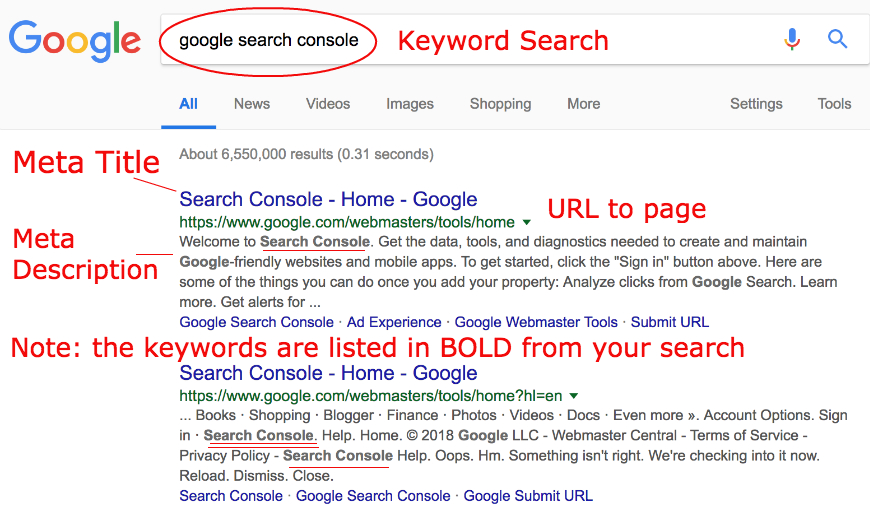
(Image Credit: HubDoHelp)
2. Publish Frequently
Publishing frequently is another important factor that contributes to increasing Domain Authority. Search engines like websites constantly publish new content, so make sure you publish blog posts regularly. Google ranks websites that publish new content more highly than those that don’t.
3. Optimize Your Content for SEO
Optimizing your website for SEO is another way to increase your domain authority. This will make it easier for Google to index and rank your website. You can optimize your website for SEO by using the correct keywords, setting up proper titles and descriptions, and creating backlinks to your website. Using effective SEO techniques, such as link building and social media marketing, would be best.
**Did you know?? 47% of users interact with three to five pieces of content before contacting a business. (Hubspot)
4. Get Links from High-Quality Websites
One of the best ways to increase your domain authority and master SEO is to get links from high-quality websites. Google will rank your website higher in the SERPs if you have links from high-quality websites. To get links from these websites, you need to create valuable content that other website owners will want to link. You can also reach out to high-quality websites and ask them to link to your content. You can also participate in link-building campaigns and exchange links with high-quality websites.
5. Use Social Media
Social media involvement is another excellent way to increase your domain authority and master SEO. By sharing your content on social media platforms, you can reach a larger audience and attract more visitors to your website. You should also join relevant social media groups and forums where you can share your content and connect with other online users, which can help you get links from high-quality websites.
**Did you know??
- Over 93% of regular internet users log into social media
- 72% of Americans use social media
6. Utilize a Website Health Checker
A website health checker is essential for improving your domain authority. A website health checker helps to enhance your website’s overall health by using web analytics tools like Google Analytics. To monitor your website’s health, you need to ensure that your website is coded correctly and that all of your content is up-to-date. You should also run regular website scans to detect malware or security threats. You can identify potential issues affecting your domain authority by monitoring your website with a website health checker. You can then take corrective action to address these issues and improve your domain authority and website’s health using a website health checker. Here is an example of a website health checker:
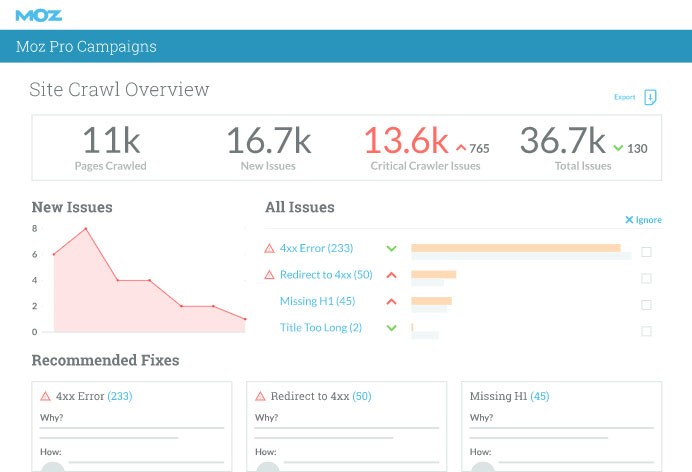
7. Register with Google Search Console
Google also considers several other factors when determining a website’s domain authority, such as using sitemaps and robots.txt files. So, if you want to master SEO, improve your domain authority and website’s ranking, you should register with Google Search Console.
8. Use Social Media Badges
Another way to improve your domain authority is to use social media badges. Social media badges can help increase the number of social media shares and help get links from high-quality websites. So, to improve your website’s ranking, you should use social media badges.
You Might Also Like
9. Optimize Your Website for Speed
Google also considers a website’s speed when determining its domain authority. So, if you want to improve your website’s ranking, you should optimize your website for speed.
10. Use Paid Search
Paid search can also help to improve your domain authority. Paid search can help to increase the number of links from high-quality websites and can also help to improve a website’s ranking in search engines.
11. Use the Mozbar Browser Extension
The MozBar browser extension is a free DA tool that allows you to see the Domain Authority of any website. This is an excellent tool for assessing the competition and determining whether or not it would be worth your time to pursue a link from a particular website.
12. Monitor Your Progress with the Diib Free or Pro Subscription
Diib Digital also offers a subscription service called Diib Pro, which allows you to track your website’s Domain Authority over time. Tracking with Diib is a great way to see how your efforts affect your DA and to master SEO for your website.
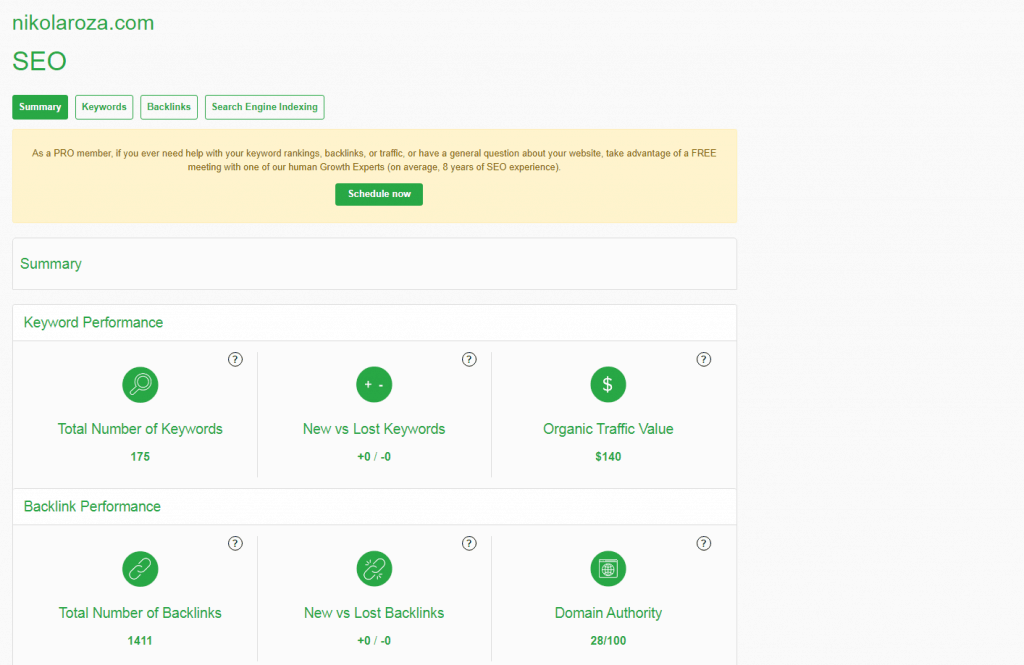
(Image Credit: SEO Tools Finder)
13. Always Be On the Lookout for New Link Opportunities
The best way to improve your domain authority is to pursue new link opportunities continuously. Keep an eye out for websites relevant to your niche, and reach out to them with a request to include a link to your website. If you can get a few high-quality links from reputable websites, your DA will skyrocket.
14. Use the Yoast SEO Plugin
The Yoast SEO plugin is a free WordPress plugin that helps optimize your website for Google search results. It includes several features that can help you improve your Domain Authority, such as keyword optimization, XML sitemaps, and breadcrumbs.
So, if you want to improve your website’s ranking, master SEO and increase its domain authority. The best way to do this is by doing the following:
- Publishing high-quality content regularly
- Optimizing your content for SEO
- Acquiring links from high-quality websites
- Using social media
- Adding keywords to your domain name
- Registering with Google Search Console
- Utilizing social media badges
- Paid search can also help in improving the domain authority
What Factors Should You Consider when Chooosing a Website Health Checker and DA tool?
Domain authority is a metric used to determine the importance of a website. This score is calculated by looking at several factors. A great place to start is by analyzing the number of links to your website and the quality of those links. To improve your domain authority, you must understand and optimize the following factors.
1. Number of Links
The first factor considered when calculating domain authority is the number of links to the site. The more links you have, the higher your domain authority will be. However, not all links are created equal. You must get links from high-quality websites to improve your domain authority.
**Did you know?? More than 66% of pages have zero backlinks pointing to them (Ahrefs)
2. Quality of Links
The quality of your links is also essential. Google looks at the rank of the websites linking to you to determine your domain authority. If you have a lot of links from low-quality websites, your domain authority will be lower than if you had fewer links from high-quality websites.
3. Age of Site
The age of your site is also considered when calculating domain authority. The older your site is, the higher your domain authority will be. This is because Google trusts senior websites more than new websites.
4. Number of Pages on Site
The number of pages on your site also affects your domain authority. The more pages you have, the higher your domain authority will be. This is because Google sees websites with more pages as being more authoritative.
5. Quality of Content
The quality of your content is also essential. Google looks at the quality and relevance of your content to determine your domain authority. If you have high-quality content, relevant to your niche, your domain authority will be higher than if you have low-quality content.
6. Social Shares
The number of social shares your content receives is also a significant factor when calculating domain authority. The more social shares you have, the higher your domain authority. This is because Google sees websites popular on social media as more important. Here are a few examples of social share icons you can use:
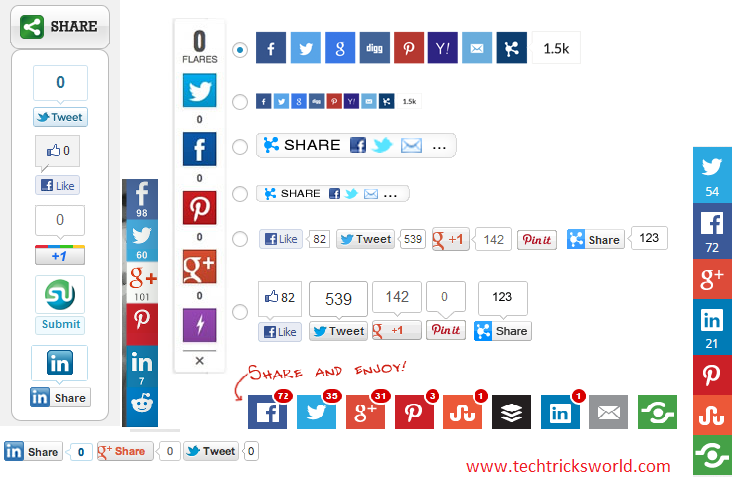
(Image Credit: TechTricksWorld)
7. Website Traffic
Website traffic is also considered when calculating domain authority. The more traffic you have, the higher your domain authority will be. Getting visitors to your website and keeping them there will have a positive impact on your DA ranking.
8. Anchor Text
Anchor text is also taken into account when calculating domain authority. The anchor text is the text used to link to your website. The more popular the anchor text is, the higher your domain authority will be.
9. Competition
Competition is also taken into account when calculating domain authority. The higher the competition in your niche, the lower your domain authority. This is because Google sees competitive niches as more challenging to rank in.
10. Location of Site
Your site’s location is also considered when calculating domain authority. If you are located in a high-competition market, your domain authority will be lower than if you were located in a low-competition market. Understanding these factors is essential for improving the domain authority.
Optimizing these factors can improve your website’s ranking and increase traffic to your site.
How to Increase Domain Authority?
Domain authority (DA) is a metric used by search engine’s to determine the strength of a website. It is calculated by considering various factors, including the number of links pointing to a site, their quality, and how authoritative the links are. We will discuss ways to improve domain authority to become influential players in their industry.
1. Publish High-Quality Content
One of the most critical factors contributing to a website’s domain authority score is the quality of its content. Google considers several factors when determining how to rank a website. One of the most important is the site’s ability to produce high-quality content valuable and relevant to its audience. If you want to improve your domain authority score, you must make sure that you publish high-quality content that is useful and relevant to your audience. This means spending time on research, writing well-crafted articles, and ensuring that your site is regularly updated with fresh content.
2. Get Links from High-Authority Websites
Another factor contributing to a website’s domain authority is the number and quality of links pointing to it. Google considers the source of the websites linking to a site when determining how to rank it. You need to get links from high-authority websites to improve your domain authority. These websites have high domain authority and are considered highly authoritative by Google.
3. Promote Your Content on Social Media
A third way to improve your domain authority is by promoting your content on social media. Social media is a great way to reach a large audience with your content and can help you to attract links from high-quality websites. If you want to improve your domain authority, make sure you promote your content on social media. This means sharing your articles on social media websites like Facebook, Twitter, and LinkedIn and using social media tools like hashtags to help people find your content.

(Image Credit: RealtyNinja Help Docs)
4. Use Keyword-Rich Anchor Text
One last way to improve your domain authority score is by using keyword-rich anchor text. Anchor text is the text that is used to hyperlink a word or phrase on a web page. When you link to another website, you should use keyword-rich anchor text. This means using keywords in your anchor text relevant to the page you connect to. This will help Google determine the relevance of your site and improve your website’s ranking in the search results.
5. Spam Scores
Make sure to keep an eye on your website’s spam scores. A high spam score can hurt your domain authority score and negatively affect your website’s ranking in the search results. To keep an eye on your website’s spam score, use a tool like Google’s Page Speed Insights or Moz’s Open Site Explorer. These tools will help you see how well your website performs and identify areas that need improvement.
6. Mastering SEO Numbers
Master SEO helps in optimizing a website to rank higher in search results. Several factors go into master SEO, and one of the most important is the number of keywords that a website ranks for. To improve your domain authority, you must ensure that your website is optimized for search engines. This means doing keyword research to find the right keywords to target and using those keywords throughout your website. Using them in your title tags, Meta descriptions, and headers would be best.
7. Analyzing the Website’s Health
Another factor that goes into SEO is the website’s health. The health of a website is determined by several factors, including its loading speed, duplicate content, and broken links. To improve your domain authority, you must ensure that your website is healthy. This means checking for any issues with your website’s health and fixing them. You can use a tool like Google’s Page Speed Insights to check your website’s health and identify any problems that need to be fixed. For instance:
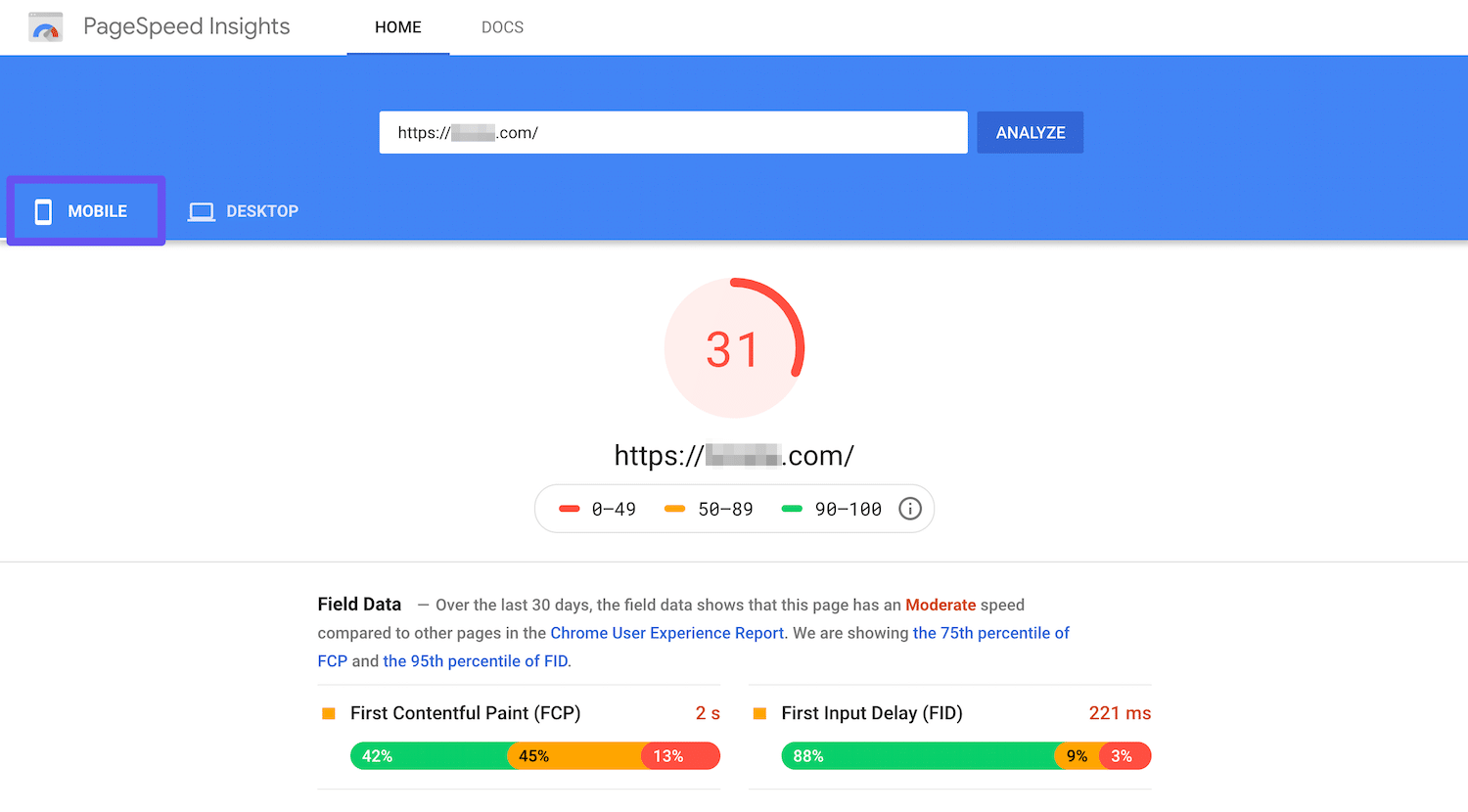
(Image Credit: Kinsta)
8. Backlinking to Strong Websites
A final factor in SEO is the number and quality of a website’s backlinks. Backlinks are links from other websites that point to your website.
If you want to improve your domain authority, you need to make sure that your website has a lot of high-quality backlinks. This means getting links from websites with high domain authority and a high PageRank. You can use a tool like Moz’s Open Site Explorer to find high-quality backlinks for your website.
9. Monitoring the Website’s Performance
A final step in optimizing your website for search engines is monitoring its performance. This means tracking how well your website ranks in the search results and identifying areas that need improvement.
You can use a tool like Google’s Search Console or Moz’s Pro Tools to track your website’s performance and find ways to improve it. These tools will help you see how well your website is ranking, how many impressions and clicks your website is getting, and which keywords drive the most traffic to your website.
Diib® Digital: Use Our Free Website Health Checker Today!
Domain authority is an essential factor that goes into SEO. To improve your domain authority, you must ensure that your website is optimized for search engines. Keeping track of your metrics is vital for the success of any campaign. Diib® Ditial offers a comprehensive user dashboard designed to give you the most up to date domain authority information and keyword health. Here are a few of the features of our dashboard you’re sure to appreciate.
- Keyword, backlink, and indexing monitoring and tracking tools
- Blacklist monitoring and objectives for repair
- User experience and mobile speed optimization
- Bounce rate monitoring and repair
- Social media integration and performance
- Broken pages where you have backlinks (404 checker)
- Technical SEO monitoring
Click here for your free scan or simply call 800-303-3510 to speak to one of our growth experts.



